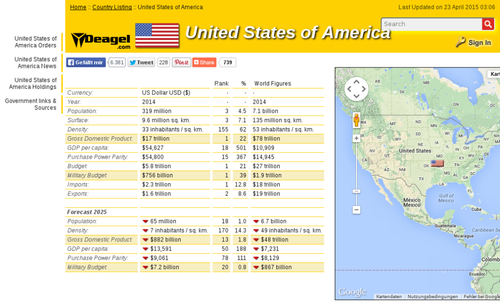Deagel
Deagel.com is a website that came into focus in the 2014 - 2015 period for population reduction predictions in many (most?) countries on the planet, and very severe reductions in some countries (United States 65 million by 2025 - 2014 forecast, Germany 48 million by 2025 - 2014 forecast).[1][2]
Archives indicate that the website started withh no such forecasts in 2007.[3] By the 2010s a forecast for 2025 predicted a reduction from 307 to 264 million in the US.[4] An archive of 2018 forecasts a reduction to 100 million by 2025 in the US.[5]
As of October 2021 the website is still publishing articles about military technology;[6] the predictions about reduced populations have been removed.
The website was mentioned once in the Wikileaks Stratfor leak (apparently as a resource for analysis in a Stratfor report - the mention is a 2010 Deagel article about a missile, thus technical information, maybe the only source the author could find at the time on that type of missile, not looking at other information on the website, or it has been placed there deliberately by a company that has the strongest connections to the national security apparatus, to use this kind of circumstance in psychological warfare operations against it's populations).[7][8]
External links
- James Corbetts 2021 report on the website - BUT WHAT ABOUT DEAGEL? - QUESTIONS FOR CORBETT #080
Documents by Deagel
| Title | Document type | Publication date |
|---|---|---|
| Document:Deagel forecasts - explanation, thoughts and reflections | Text | 26 October 2014 |
| Document:Deagel forecasts - updated disclaimer September 2020 | Text | 25 September 2020 |
Related Document
| Title | Type | Publication date | Author(s) | Description |
|---|---|---|---|---|
| File:Deagel 2025 Forecast.zip | Archive | Archive of the 2025 population forecast |
References
- ↑ http://web.archive.org/web/20150623115230/http://removingtheshackles.blogspot.com/2015/06/deagle-population-estimates-for-2014.html (screenshots are archived as pictures separately)
- ↑ https://web.archive.org/web/20180910154211/http://christianobserver.net/drastic-population-reduction-per-deagel-com-demand-answers
- ↑ https://web.archive.org/web/20070921140529/http://www.deagel.com/country/United-States-of-America_c0001.aspx
- ↑ https://web.archive.org/web/20100630110104/http://www.deagel.com/country/United-States-of-America_c0001.aspx
- ↑ https://web.archive.org/web/20180903063203/http://www.deagel.com/country/United-States-of-America_c0001.aspx
- ↑ https://web.archive.org/web/20211006111728/https://www.deagel.com/news
- ↑ http://web.archive.org/web/20200705025806/https://elexonic.com/2020/03/25/cia-frontgroup-predicted-us-europe-would-lose-large-part-of-their-population-by-2025/
- ↑ https://wikileaks.org/gifiles/docs/26/2655808_dprk-marko-p-.html
